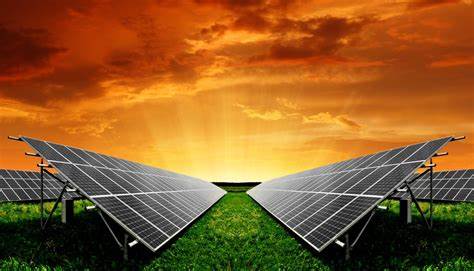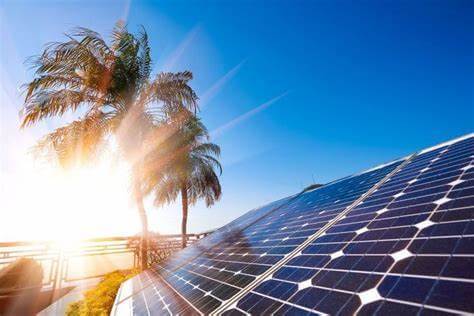Advantages and Disadvantages of Solar CellAny device that uses the photovoltaic effect to directly convert light energy into electrical energy is referred to as a solar cell or photovoltaic cell. Amorphous (non-crystalline), polycrystalline, and crystalline (single-crystal) types of silicon, each with differing degrees of efficiency and cost, are used to make the vast majority of solar cells. Solar cells do not require a fuel source to produce power, unlike batteries or fuel cells. They are unlike electric generators in that they do not include any moving parts. Arrays are big collections of solar cells that can be put together. These arrays, made up of thousands of individual cells, can serve as central electric power plants, transforming solar energy into electricity and distributing it to customers in the industrial, commercial, and residential sectors. Homeowners have put solar panels, also known as solar cells or just solar cells, in much smaller designs on rooftops to supplement or replace their traditional energy supply. 
Since solar cells don't have any moving parts that might need maintenance or fuels that need to be replenished, they are the power source for the majority of space facilities, including communications, weather, and space stations. Solar power is insufficient for space probes deployed to the outer planets of the solar system or into interstellar space, however, due to the radiation's diffusion with growing distance from the Sun. Solar cell panels are also utilized to generate electricity in many isolated areas of the Earth, where installing conventional power sources would be either impossible or prohibitively expensive. Electronic toys, pocket calculators, and portable radios are just a few examples of consumer goods using solar cells. Such gadgets can use natural and artificial light, including incandescent and fluorescent bulbs, to power their solar cells. 
Although photovoltaic energy is produced in very small amounts, when fossil fuel resources are depleted, this output is anticipated to rise. In reality, estimates based on the predicted global energy consumption by 2030 show that the world's energy requirements could be met by solar panels that covered just 496,805 square kilometers (191,817 square miles) of the planet's surface and operated at a 20 percent efficiency. Since silicon is the second most common element in the crust of the Earth, the material requirements would be enormous yet attainable. These qualities have inspired solar energy supporters to imagine a "solar economy" where sunshine serves as a cheap, clean, and abundant energy source for almost all human needs. Advantages of Solar Cell
Solar energy is a renewable energy source, making solar cells' use of it the most evident benefit. The Sun, wind, and waves can all be used to generate renewable energy, which is the Sun. Sunlight energy is captured by solar cells and converted into electricity used in home and commercial sectors. Solar energy is unique in that there is no limit to its supply. The creation of power from solar energy is a sustainable source that we can rely on indefinitely, even though it may appear insignificant. Additionally, it is possible to produce both power and heat using solar PV or solar thermal systems.
Solar cells have another advantage: you can significantly reduce your power bill because you are not charged for the energy you produce. According to the number of panels you use, you might save anywhere from £160 to £430 per year on your electricity cost. You can also make money from your photovoltaic system at the same time. Of course, to use your solar system to purchase and sell electricity from the grid, it must be connected to the grid. In addition, you can get several solar panel incentives, and there will be more financial advantages down the road. In terms of maintenance expenses, solar cells can perform better than any other type of energy source. They don't have any moving parts, so you don't need to worry about maintenance.
Solar cells have the significant advantage of producing nearly no pollution. When it comes to creating solar cells, their transportation, and the installation process, pollution and waste discharge are unavoidable. But in comparison to the use of conventional energy sources, this is a tiny portion. In addition, worries about end-of-life solar cells have considerably diminished thanks to advancements in recycling solar cells. A further benefit of solar cells is that they don't create noise pollution, making them ideal for use in homes and urban locations.
A hot topic in green energy, photovoltaics is regarded as an effective method of halting global warming. It is also one of the most technologically advanced industries compared to other renewable energy sources. It has already created a novel field of study that is continually being researched and developed. It has created countless jobs at various levels, from researchers and scientists to PV installers, thanks to the tremendous funding governments invest in this industry. Therefore, if the investments continue, the solar cell industry will also benefit from the employment prospects it may provide.
One of the solar cells' biggest benefits is that it will be cheaper to use them to generate electricity. Energy bills for businesses and households will decrease due to reduced grid demand brought on by solar power output. The cost of purchasing energy from conventional sources is kept the same when power is produced at home.
Solar cells, the most affordable type of clean and renewable energy-producing equipment, will be in high demand in the future. Solar energy is regarded as the least expensive method of generating electricity. Due to intense competition, solar panels are getting more economical while still retaining good quality, which has decreased the price of solar cells.
A wide variety of solar panel products are readily available, ranging from low-cost options for homeowners to high-end models that are built to last. Additionally, various solar-compatible goods for residential and commercial use have entered the market.
The excess energy generated that is not fully consumed at home can be given to the community or the government. This enables your community to use energy from the Sun to supply cleaner energy to their homes. Additionally, the government provides various incentives to promote increased solar energy use. Disadvantages of Solar Cell
The cost of installing solar panels is one of the biggest problems with solar energy. For example, a 5kW solar PV system is projected to cost between £7000 and £9000, depending on your roof type and other variables. The good news is that this issue is solvable. As a client or investor in green energy, you can get energy lending from most UK banks at a low-interest rate. The fact that solar energy is produced for free and incurs no operating expenses should be remembered above all else. Since PV panels don't require any fuel, the initial expense can eventually be recovered.
Not all homes can meet their needs and get the most out of their solar panels. Due to the location-sensitive nature of solar cells, it might be challenging to fully utilize solar installation if there is shade on your property. You can connect to the grid as a solution, allowing you to purchase electricity from other people. In many instances, it can even be challenging to rely completely on the electricity produced by solar panels. Therefore, your best option is grid-connected PV panels.
Since we occasionally experience less Sun in the UK, solar power plants are significantly more seasonal than other forms of renewable energy. Grid-connected solar arrays are the answer, and when there is less energy to collect, they can buy power from the power grid. The energy produced during peak hours can be stored in a solar battery storage system, making it easily accessible on overcast and rainy days. This is another smart investment.
Older homes often have distinct features that might provide shade, making installing solar panels more challenging. In addition, flat roofs where drifting snow can end up below the racks become too heavy for a solar-paneled roof. Therefore, you must ask about these topics when you receive offers. Requires sunny weather: The major drawback of solar cells is that they can only generate energy when enough sunlight hits the panel. If there is not enough sunlight, such as on cloudy days, the solar cells will not be able to produce power. Similarly, energy can only be created during the day and not at night.
The production of plastic garbage and the combustion of fossil fuels is necessary for the mass production of solar panels. One drawback of solar panels is that they are not environmentally friendly when manufactured in large quantities.
The drawback of solar cells is that they can only generate electricity from about 25% of solar energy. More technology advancements are needed to optimize solar energy because it is possible to use it.
Once placed, solar cells are challenging to remove and reinstall in another location. Your system must be dismantled and transported to a different place, which requires additional money and labor. The Conclusion:Since technology is progressing, the cost of solar plates and installation will reduce so that anybody can attempt to install the system, even though solar cells have some disadvantages. These disadvantages are expected to be overcome as the technology progresses. In addition, the government is placing a lot of focus on solar energy, so in a few years, we might expect every home and electrical system to be powered by solar or another renewable energy source. |
 For Videos Join Our Youtube Channel: Join Now
For Videos Join Our Youtube Channel: Join Now
Feedback
- Send your Feedback to [email protected]
Help Others, Please Share









